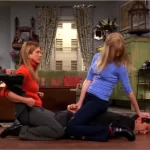A War: One of Them, by David Bax
With its moral dilemma of a fulcrum and its motif of a marriage tested by the duty and distance of a soldiering husband, Tobias Lindholm’s A War bears all the markings of a topical, made-for-television melodrama. Yet with his lean, deliberate narrative and aesthetic choices, Lindholm has stripped the story down to its most powerful essence.
A War tells the story of Danish military man Claus Pederson (Pilou Asbæk) and his wife, Maria (Tuva Novotny). He is the leader of a group of Danish troops at a forward operating base in the Afghan countryside; she is the mother to three children, the eldest of whom is increasingly acting out at school the longer his father is away. Though they are separated by thousands of miles, Lindholm tracks their stories as parallels, giving each equal weight and screen time and linking them via the sporadic, brief, garbled phone calls they are able to manage. Until, that is, a chain of events among Claus’ unit alters things drastically for both spouses.
Asbæk and Novotny serve the material well as the film’s twin anchors. She gives us a capable and pragmatic mother and wife who nonetheless is showing the strains of bearing her load mostly alone. He, who looks something like a cross between Joshua Jackson and Michael Shannon, brings the same malleability of those two actors, showing us in Claus enough of a confident hero that it pains us when we must consider that he might be otherwise. The only weak link is the late-emerging character of the antagonistic government official. The actor in that case is a bit too keen to play her as a straight-up villain.
As a work of art that exists in the fourth dimension, a film is particularly well-suited to be a document of process. Whether it’s a patrol to a dangerous village or the scheduling of a parent-teacher conference, Lindholm refuses to coddle or titillate us by cutting to the juicy bits. The resulting scenes are therefore imbued with the tension of not knowing when or how the expected next step will transpire. We also get the impression, erroneous or not, that Lindholm is being forthright with us.
While avoiding stylistic flourishes, Lindholm and cinematographer Magnus Nordenhof Jønck produce clear and striking images. The color palette remains organic to the settings and the ample framing allows for the maximum relay of information with an economy of time. A War’s only visual trick is to repeatedly highlight the pressure bearing down on the characters by cropping out their headspace with windows or the low ceilings of a bunker, like nature’s own letterboxing.
A War shows us how a bad decision tends to lead to more bad decisions. More than that, though, it’s about how such decisions are often based on our valuing the lives and interests of others on a sliding scale. Perhaps, without thinking, we’ve placed more importance on the people in our proximity than on those we can’t see. Or, conversely, perhaps those right in front of us subconsciously mean less because their customs and language are not our own. These are queasy but vital questions to ponder and Lindholm does so with remarkable sobriety and potency.






























